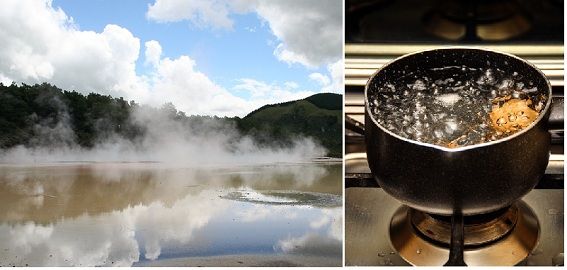 Vaporization is a process of phase transition in which a substance, changes its state from liquid to vapour. It can take place in two ways, i.e. evaporation and boiling. The process of evaporation involves phase transition at a temperature below the boiling temperature. On the other hand, boiling of a substance takes place at boiling point, which may vary with the change in the environmental pressure.
Vaporization is a process of phase transition in which a substance, changes its state from liquid to vapour. It can take place in two ways, i.e. evaporation and boiling. The process of evaporation involves phase transition at a temperature below the boiling temperature. On the other hand, boiling of a substance takes place at boiling point, which may vary with the change in the environmental pressure.
Water boils at 100°C, and the temperature does not rise even if heat is continuously supplied to it. As against, the rate of evaporation depends on the surface area, in the sense that the larger the area, the faster would be the process. Let’s take a look at the article provided below which simplifies the difference between boiling and evaporation.
Content: Boiling Vs Evaporation
Comparison Chart
| Basis for Comparison | Boiling | Evaporation |
|---|---|---|
| Meaning | Boiling implies a vaporization process that turns liquid into gas, when continuously heated. | Evaporation is a natural process, wherein the liquid changes its form to gas due to the increase in temperature or pressure. |
| Phenomenon | Bulk | Surface |
| Temperature required | Occurs only at boiling point. | Occurs at any temperature. |
| Bubbles | It forms bubbles | It does not forms bubbles. |
| Energy | Source of energy is required. | Energy is supplied by the surrounding. |
| Temperature of liquid | Remains constant | Reduces |
Definition of Boiling
Boiling is a physical change and a type of rapid vaporization in which the liquid is converted to vapour when it is constantly heated at the such a temperature that the vapour pressure of the liquid is same as the external pressure, exerted by the surrounding.
The temperature at which boiling starts is known as the boiling point. It depends on the pressure exerted upon the liquid, i.e. the greater the pressure, the higher will be the boiling point. In the boiling process, when the molecules of the substance are so spread that it can change its state, the bubbles are formed and boiling starts.
In this process, as we heat the liquid, the vapour pressure rises, until it is equal to the atmospheric pressure. After that, the formation of bubbles will take place within the liquid and move to the surface and burst resulting in the release of gas. Even if we add more heat to the liquid, the boiling temperature will be same.
Definition of Evaporation
The process in which an element or compound is converted from liquid state to gaseous state, because of the rise in temperature and/or pressure is known as evaporation. The process can be used to separate the solid dissolved in the liquid, such as salt dissolved in water. It is a surface phenomenon, i.e. it happens from the surface of the liquid into vapour.
Heat energy is the basic requirement for evaporation to take place, i.e. to split the bonds that hold the molecules of water together. In this way, it helps water to evaporate slowly, at the freezing point.
Evaporation largely depends on the temperature and the amount of water present in the waterbody, i.e. the higher the temperature and the more the water is there, the higher will be the rate of evaporation. The process can take place in both natural and man-made environment.
Key Differences Between Boiling and Evaporation
The points given below are noteworthy as they explain the difference between boiling and evaporation:
- Boiling refers to the process of vaporization, wherein the liquid state is turned into the gaseous state, at a definite boiling point. On the contrary, evaporation is defined as a natural process, in which the increase in temperature and/or pressure changes liquid into gas.
- Boiling is a bulk phenomenon, in the sense that it occurs throughout the liquid. Conversely, evaporation is surface phenomena, which take place only on the surface of the liquid.
- Boiling of a liquid occurs only at the boiling point of that liquid, i.e. it takes place only at a definite temperature. As against, evaporation process can occur at any temperature.
- In boiling, bubbles are formed within the liquid, then they move up and burst into gas, whereas no bubbles are formed in the process of evaporation.
- While the source of energy is required in the boiling process, in evaporation energy is provided by the surrounding.
- In boiling, the temperature of liquid remains same, whereas in case of evaporation the temperature of the liquid tends to decline.
Conclusion
To sum up, boiling is a faster process in comparison to the evaporation, as the molecules of the liquid, move faster in boiling than in the process of evaporation. While boiling produces heat and does not cause cooling of the liquid, evaporation leads to cooling of the liquid.






sing it says
Amazing
snow says
Amazing
Justin Jr says
Just fantastic loved it
Kritika says
It’s amazing